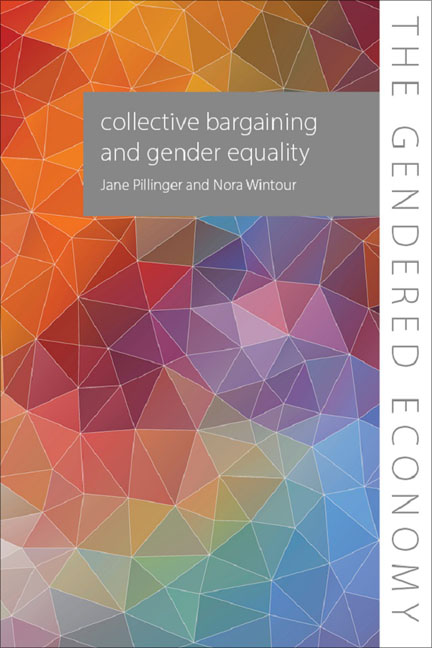Book contents
- Frontmatter
- Dedication
- Contents
- Acknowledgements
- Acronyms
- Foreword
- 1 Introduction
- 2 The gender dimensions of collective bargaining
- 3 Collective bargaining as a tool for gender equality: evidence from across the world
- 4 Changing employment patterns, precarious and informal work, and the challenge for collective bargaining
- 5 The global dimension of collective bargaining: the role of global framework agreements in promoting gender equality
- 6 Conclusion
- References
- Index
6 - Conclusion
Published online by Cambridge University Press: 09 August 2023
- Frontmatter
- Dedication
- Contents
- Acknowledgements
- Acronyms
- Foreword
- 1 Introduction
- 2 The gender dimensions of collective bargaining
- 3 Collective bargaining as a tool for gender equality: evidence from across the world
- 4 Changing employment patterns, precarious and informal work, and the challenge for collective bargaining
- 5 The global dimension of collective bargaining: the role of global framework agreements in promoting gender equality
- 6 Conclusion
- References
- Index
Summary
Collective bargaining, as both a tool for representing workers’ interests and a method for finding common solutions with employers to workplace issues, has enormous potential to address structural gender inequalities. However, many of the changes discussed in this book point to the need for new thinking about how gender equality can be more effectively integrated into union strategies, policies and advocacy. Both bipartite and tripartite social dialogue has never been so relevant to workers, particularly to women workers in formal and informal employment across the world. At the International Labour Conference in 2009, tripartite delegations discussing “gender equality at the heart of decent work” emphasized that social dialogue is fundamentally about equitable participation.
It is through participation that women and men can achieve decent and productive work in conditions of freedom, equity, security and human dignity … The challenges of promoting gender equality through social dialogue are twofold. First, there is the matter of increasing the participation and status of women in the process. Second, there is the challenge of introducing a gender perspective into the content so as to reflect the changing nature of labour markets and patterns in the world of work. (ILO 2009a: 161)
These same issues were still being discussed in 2018 at the ILC, where a resolution on social dialogue and tripartism stressed the urgency of ensuring that social dialogue addresses gender equality in the light of the rapidly changing world of work (ILO 2018g). Women have entered paid employment and are joining unions or other membership-based organizations in growing numbers, and in some countries, women now outnumber men in union membership. However, in many parts of the world, collective bargaining coverage continues to be limited and only covers a proportion of the formal economy workforce, often in male-dominated industries and the public sector. Collective agreements do not necessarily extend to contract and subcontracted workers in the supply chain in key sectors of women’s employment. The majority of workers, many of whom are women own-account workers in the informal economy, remain outside of and are unprotected by collective bargaining.
- Type
- Chapter
- Information
- Collective Bargaining and Gender Equality , pp. 129 - 144Publisher: Agenda PublishingPrint publication year: 2018

